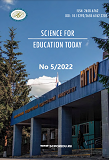Целевые установки моделирования профориентационной работы в системе образования региона
Target settings for modeling career guidance in the education system of the region
Author(s): Marina Viktorovna Shakurova, Vladimir Vyacheslavovich Pashkevich, Arsen Rubenovich Arakelyan, Valery Ilyich TarlavskySubject(s): Education, Regional Geography, Sociology of Education, Pedagogy
Published by: Новосибирский государственный педагогический университет
Keywords: Career guidance; Target setting of the career guidance model; Choosing a career; Professional self-determination; Career development; Professionalism;
Summary/Abstract: Introduction. The article is devoted to the problem of insufficient theoretical justification of modeling career guidance in the education system of the region, primarily to identifying foundations of goal-setting. The aim of the study is to identify the features of the leading targets in modeling career guidance in the education system of the region, and to consider the possibility of their simultaneous use in the modeling of career guidance in the education system of the region. Materials and Methods. The study follows paradigmatic, socio-pedagogical and learnercentered approaches. The authors summarize and integrate educational, psychological and sociological theoretical ideas on the problem of this research. Methods of theoretical analysis, comparison, generalization, analysis of infographic representations of models of career guidance are used in order to solve the research problem. Results. Literature analysis enabled the authors to identify the leading constructs used as the basis of goal-setting in the models of career guidance in the educational system of the region (choosing a career, professional self-determination, career growth, professionalism), and to clarify their content characteristics. The construct ‘choosing a career’ focuses on a personal specific result; ‘professional self-determination’ deals with the process of personal and professional development through making meaningful decisions, involving a possibility of a career choice. ‘Career growth’ concentrates on the process of movement to social understanding of profession success. ‘Professionalism’ implies self-transformation in the interests of the profession not only in terms of technological readiness, but also personal compliance and moral attitudes. The authors proposed a way of coordinating the main targets of modeling career guidance in the education system of the region: a) the ideal goal (strategic goal) is defined through the formation of professionalism (at the personal level); orientation to career planning and career growth (in broad connotations) can be included in the structure of professionalism; b) the goal as the expected result of career guidance practices (tactical goal) is defined through professional self-determination. Conclusions. The authors conclude that the appropriate selection of target foundations contribute to clarifying qualitative characteristics of career guidance models in the education system of the region. Based on selecting leading constructs within the target setting, a typology of regional models and evaluation of their qualitative effectiveness can be made. The variants of combining leading constructs allow to define priorities, which determine the main direction and specifies organizational and methodological content of the model.
Journal: Science for Education Today
- Issue Year: 12/2022
- Issue No: 5
- Page Range: 90-112
- Page Count: 23
- Language: Russian

